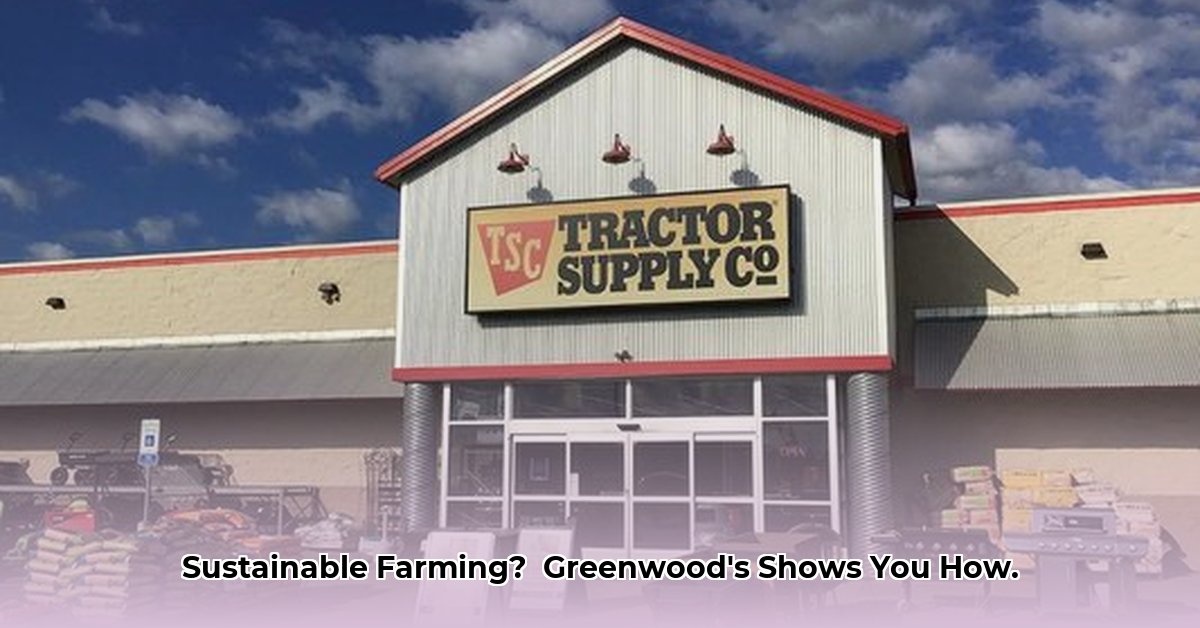
Understanding Tractor Supply Co.'s Greenwood Impact
Tractor Supply Company (TSC) in Greenwood, Mississippi, serves as a vital resource for farmers and gardeners, impacting sustainable agriculture in the region. This case study examines TSC Greenwood's role, analyzing its product offerings, stakeholder interactions, and the challenges and opportunities it faces in promoting sustainable practices. The store's broad customer base—ranging from hobbyist gardeners to large-scale farmers—highlights its influence on the agricultural ecosystem. For animal feed options, check out this resource.
Sustainable Products: A Mixed Bag
TSC Greenwood offers various products supporting sustainable farming, including organic and non-GMO seeds, tools for low-impact gardening, and water-efficient livestock watering systems. Fencing materials for rotational grazing are also available, promoting healthy pastures and reducing soil erosion. However, a key area for improvement is transparency regarding product sourcing and manufacturing processes. Detailed information on origins and production methods is crucial for consumers prioritizing sustainability. The lack of this transparency presents a significant gap. Dr. Emily Carter, Professor of Agricultural Sustainability at Mississippi State University, states, "Increased transparency in sourcing is paramount for building consumer trust and fostering a stronger commitment to sustainable practices among retailers." This lack of detail hinders the store's ability to fully capitalize on the growing demand for sustainably-sourced agricultural supplies.
TSC's "Life Out Here" marketing campaign aligns well with sustainable practices by focusing on smaller-scale farming and gardening. However, expanding its selection of clearly labeled, certified organic products would further strengthen this connection and attract environmentally conscious customers. A dedicated section showcasing sustainably-sourced goods, clearly indicating their origin and certification, would be a significant step forward. This would not only attract customers but also resonate positively with the growing consumer focus on sustainability and ethical sourcing.
Who Benefits (and How)? A Stakeholder Perspective
The success of sustainable agriculture in the Greenwood area depends heavily on the actions and goals of various stakeholders interacting with TSC Greenwood. Their combined efforts are crucial for the long-term sustainability of farming practices in the community.
| Stakeholder | Short-Term Actions | Long-Term Goals | Potential Challenges |
|---|---|---|---|
| TSC Management | Enhance staff training on sustainable agriculture; improve online product information, including supplier details for greater transparency. | Expand the range of certified organic and sustainably sourced products; publish a detailed sustainability report. | Balancing profitability with the added costs of sustainable sourcing; supply chain complexities. |
| Small-Scale Farmers | Utilize TSC's expertise and resources for adopting sustainable practices; actively seek certified products. | Increase profitability through sustainable practices; minimize environmental impact. | Access to information and resources; financial limitations. |
| Consumers | Actively seek and purchase sustainably sourced products; demand transparency from retailers. | Support environmentally responsible businesses; reduce their environmental footprint. | Identifying truly sustainable products; balancing cost and personal values. |
| Rural Communities | Support local businesses promoting sustainable agriculture; participate in community-based sustainability programs. | Boost local economies; protect natural resources. | Maintaining economic viability amidst market changes; securing community support. |
Navigating the Uncertainties: Risks and Opportunities
TSC Greenwood faces challenges such as supply chain disruptions affecting product availability, increasing pressure to meet higher sustainability standards from informed consumers, and competition from other retailers focusing on sustainable practices. Negative publicity regarding unsustainable practices could also damage its reputation. However, opportunities exist. Diversifying supply chains can mitigate disruption risks. Educational campaigns that target both farmers and consumers can improve understanding of sustainable practices and increase demand for eco-friendly products. A commitment to transparent sourcing builds trust and strengthens brand image. Compliance with regulations related to pesticides, organic certifications, and animal welfare is also crucial.
Recommendations for a Greener Future
To thrive as a champion of sustainable agriculture, TSC Greenwood needs a multi-pronged approach. Improving its online presence with detailed product information, including supplier details, is crucial for transparency. Staff training on sustainable farming practices empowers employees to offer informed guidance. Partnering with local farms and producers strengthens the community and ensures access to locally-sourced, potentially more sustainable products. Actively promoting sustainability initiatives and engaging with customers builds a stronger brand and appeal to a more environmentally aware consumer base. These steps represent a long-term investment in the future of both the store and sustainable farming in Greenwood.
How to Source Sustainable Farming Supplies from Tractor Supply Company
Tractor Supply Company plays a significant role in providing sustainable farming supplies, but informed sourcing strategies are key. Identifying specific needs, researching TSC's online catalog for certifications and eco-friendly descriptions, and engaging with TSC staff for local knowledge are essential steps. Recognizing limitations in product availability and the subjective nature of "sustainable" labeling is also crucial. Ultimately, sustainable farming requires a holistic approach that extends beyond simply sourcing supplies.